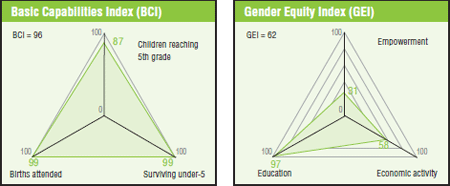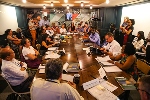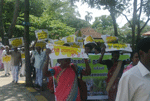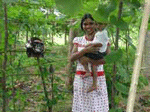Sri Lanka
Ecological agriculture is the way out of poverty
Experiences of farmer organizations and people’s organizations over the last 15 years show that ecological agriculture is a very effective way of overcoming hunger and poverty and of reducing ill health, and ecological destruction caused by conventional chemical farming. Over a hundred organizations of farmers, fishers, women, plantation workers and industrial workers have struggled in Sri Lanka for a more logical, workable and people friendly approach and strategy for economic improvement, reduction of poverty and hunger and for social justice. Today they are able to present a very workable alternative approach to the economy and development process in the country. It has succeeded in getting the Government to accept some aspects of this strategy at least as election promises. It is a strategy that is relevant to the current world situation and a strategy that can be worked out to a considerable degree.
Published on Mon, 2018-07-16 00:00
The experience of Voluntary National Reviews and of Civil Society shadow (or spotlight) reporting. The side event "SDG Implementation at National Level: What’s the Point of National Reports?" was held on July 17 in New York, during the meeting of the High Level Political Forum of the UN. The debate focused on voluntary national reports (VNRs) and parallel “shadow” or “spotlight” reports generated by civil society organizations (CSOs) on progress towards the Sustainable Development Goals (SDGs). |
| Published on Fri, 2013-02-22 06:11 |
Published on Thu, 2013-02-21 18:42
Experiences of farmer organizations and people’s organizations over the last 15 years show that ecological agriculture is a very effective way of overcoming hunger and poverty and of reducing ill health, and ecological destruction caused by conventional chemical farming. Over a hundred organizations of farmers, fishers, women, plantation workers and industrial workers have struggled in Sri Lanka for a more logical, workable and people friendly approach and strategy for economic improvement, reduction of poverty and hunger and for social justice. Today they are able to present a very workable alternative approach to the economy and development process in the country. |
Published on Wed, 2012-10-17 11:57
More than 300 homeless Sri Lankan tea estate workers marched to demand land and housing rights in the city of Kandy on Sunday 14th. They have been angered by a clause in the national budget which proposes leasing unused plantation land to businesses. |
|
Published on Thu, 2012-03-15 13:23
In terms of gender equity Sri Lanka is the second best among South Asian countries, but the region presents the widest gap among all regions on Earth. |
Published on Mon, 2012-02-27 07:55
Ensuring guaranteed and diverse seed supplies and crop production has been an important part of the work of the Movement for National Land and Agricultural Reform in Sri Lanka (MONLAR), focal point of Social Watch in Sri Lanka. Here is the story of one family who, with its support, has been able improve both its diet and its income through bio-diverse agricultural practices. |
SUSCRIBE TO OUR NEWSLETTER






